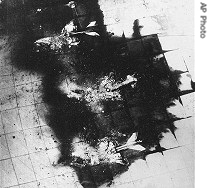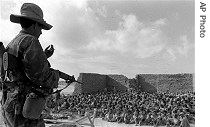2007年VOA标准英语-In Egypt, Legacy of 1967 Defeat Still Burns(在线收听)
Cairo
06 June 2007
As countries throughout the Middle East mark the 40th anniversary of the 1967 Arab-Israeli War, also known as the Six-Day War, the sting of the rapid military defeat is still sharply felt in Egypt and across the Arab world. Increasingly, critics are noting another side of the war's legacy, saying the humiliating military loss to Israel has been used to justify authoritarian rule. VOA Correspondent Challiss McDonough has more from Cairo.

Egyptian airplanes are seen destroyed on the runway after being bombed by Israeli warplanes during the Six Day War, June 1967
The rapid and extreme military defeat stung all three Arab states that fought in the war. All three lost territory; in six days, Israeli troops took the Golan Heights from Syria, the West Bank and East Jerusalem from Jordan, and the Sinai Peninsula and Gaza Strip from Egypt.
For the people of Egypt, where then-revered leader Gamal Abdel Nasser had touted the country's military might as unparalleled, the defeat was especially shocking, because it shattered the nation's carefully cultivated myth of invulnerability.
Cairo resident Ahmed Awad was 22-years old at the time, and remembers the war well.
He says "In the beginning I can tell you that everyone truly believed that in two hours, we could invade Israel and seize it all, and that would be it, we would have taken it. Because what is this Israel? And how many millions are we?"
The Egyptian press tried to convince the people that they were winning the war. Awad, now 62, was then living in the town of Suez, near the canal. As he saw exhausted and battered Egyptian soldiers returning from Sinai, he slowly realized that the reports of victories were lies.
Political and military analyst Mohamed el-Sayed Said is a deputy head of the Al-Ahram Center for Political and Strategic Studies.
 |
| Egyptian prisoners are guarded by Israeli troops after being captured near Al Arish in the Sinai during the Six Day War, June 1967 |
People in the Arabic-speaking world usually refer to the Six-Day War as "naksa," the Arabic word for setback. Originally, the term was aimed at downplaying the significance of the defeat. But this year especially, critics are saying the Arab world has suffered 1,001 setbacks since 1967.
In the pan-Arab newspaper Al-Sharq Al-Awsat, a political cartoon showed a man with a calendar, where every single day is June 5.
The lingering legacy is still felt acutely in Egypt, which at the time of the war was a leader of the Arab world. But in the 40 years since, Egypt has lost much of its stature. A newspaper columnist recently wrote that Egyptians blame the 1967 defeat for everything from price hikes to sexual impotence.
The complaints echo a common frustration with what many people here see as the stagnation or regression of Egyptian society in many areas, including education, culture, politics, the economy and even sports.
Mohammed el-Sayed Said says one legacy of the defeat is the rise of political Islam, as disappointment in Mr. Nasser's secular Pan-Arabism began to turn more and more young people toward Islamist movements. He says secular reformers, having failed in their bid to democratize Egypt, are "totally demoralized."
"Well when we reminisce over the last 40 years, the greatest frustration is not the defeat itself, it is in fact the failure of the reform movement to bring about democracy, because that was the focus of all political and cultural criticism that focused on explaining the 1967 defeat," Said said. "We have all come to agree that the defeat is caused by the lack of transparency, lack of checks and balances, lack of accountability and lack of, you know generally, democracy."
To mark the anniversary, Arab satellite TV stations are broadcasting grainy old television footage of the battles and speeches surrounding the war. Egyptian newspapers are full of bleak commentary, much of it critical of the Arab regimes.
An unsigned editorial in the Egyptian opposition weekly newspaper Al-Dustour said after 40 years, Egypt has failed to learn any true lessons from the war. The paper wrote "The lesson was clear: If we want victory over our enemies, we must build a democratic country."
But Al Dustour said after 40 years, Egypt is still ruled by one man "who always takes us backward while other nations move forward."
In the pan-Arab daily Al-Hayat, columnist Abdullah Iskandar blasted Arab leaders for failing to analyze and address the root causes of the defeat. He accused them of focusing more on retaining their own power. Iskandar says the 1967 war has been used as "a justification for despotism and totalitarianism, and a pretext to suppress Arab society."
He writes that "forty years ago, the choice was between a military regime resulting from a coup, or a pluralistic democratic system." He says today, the options are "a despotic ruler on the one hand, and fundamentalism and civil wars on the other."